- Home
- Allison Brennan
Betrayed: Powerful Stories of Kick-Ass Crime Survivors Page 7
Betrayed: Powerful Stories of Kick-Ass Crime Survivors Read online
Page 7
They grin and throw Jake into the vehicle. He yowls. “Shaddup, ya hemorrhoid,” Bronc says, swatting the back of his head. “Pick on our sister and that’s what ya get.” He motions me closer, and I walk over. “Did you ever find that special cut of meat you wanted?” he asks casually. “For that barbecue you were planning?”
My face lights up like Hollywood kliegs. “You found a source?”
“Yep. Buddy knows a guy who knows a guy, and she gave me a call. I drove to Orlando and got your package. I put it on ice and hauled it back here for ya.”
“Thanks, man,” I say, pumping his hand. “I owe you.”
“No ya don’t. This one’s gratis,” Bronc says. “I stored yer meat at my house. Lemme know when ya want it delivered.” He punches Anders’ shoulder and they take off. I go back into the house to hear happy campers chattering with their long-lost sister. Their reconciliation pleases me greatly, because I don’t know how much longer they can celebrate.
Alex is dying of metastatic breast cancer. On that one single score Jake was right: men get breast cancer too. Alexander contracted his at fifteen, more than a decade before we met. That cancer was scraped clean with scalpels, radiation, and chemo. After a decade of oncological supervision, he was declared cured . . . and he announced his decision to formally become Alex, something he’d been building up the courage to announce since third grade, when he knew for certain he’d been born in the wrong body. The family disowned him. Years later, when he was a woman in every regard, including surgically, we met, married, and made plans for the odd months I was on leave from the war on terror. We thought love and time would never end.
We were half right.
In medical lingo, Alex had “metastasized,” meaning that her “cured” cancer had come back as a zombie army. Tumors were growing in her lungs, liver, kidneys, stomach, abdominal lining, and the long bones of her thighs and forearms. The love of my life had stage four metastatic breast cancer. There was no stage five.
“Mets” are cells from the original “plain old” breast cancer—in Alex’s case, what she suffered in boyhood. But they’re the hardy cockroaches that survive chemotherapy and radiation by hiding deep in the recesses of the victim’s body. They wait years, sometimes decades, cunning and patient, and when they’re ready to kill, they leap from their hiding places and spit incurable tumors like machine gun bullets. Mets are the terrorists of Cancerland . . .
I hear the bedroom door creak. Alex’s three sibs were walking out backward, waving. “Back in the morning, Ali,” Doris says.
“Love . . . you,” Alex says.
“Thank you, Pig,” Doris says, taking my hands and squeezing. “You don’t know how much this means to us, seeing her again.”
“Come by at eight,” I say. “I’ll make waffles.”
She smiled. “Where did you leave idiot child?”
“MPs piled him next to your car. Cape Fear hospital’s straight down the freeway from the main gate. I’d say sorry, but . . .”
“You’re not. Which makes you a very good man. I’m delighted you and Alex found each other,” Doris says, hugging me. I’m surprised to find myself hugging back. But they’d put themselves on the line for their sister’s sake, risking exile from their family, and that was as brave as anything I did on a battlefield.
I lock the front door as they leave, then limp into our bedroom, the smackdown of her brother’s knee making my broken toe ache like ten rounds with Tyson. Alex beams as I tuck her sheet and straighten her pillow. “Fam. Loves. Me. Again.”
“No fools they,” I say. “Want to talk about Jake?”
She nods, one inch up, one inch down. “Nap. First. Okay?”
“Sweet dreams,” I say even as she slips into unconsciousness.
I’ve seen a lot of war. But Alex’s is far more brutal because I can shoot back and she can’t. The final horror was the shutdown of her digestive system. No matter how much food Alex ingests by mouth or feeding tube, her stomach and intestines won’t turn it into energy. Zero calories. Zero nutrition. Zero chance of reversal, because the Mets literally destroyed the nerves that energize those organs. Which Alex finds bitterly amusing: as a diehard Chicago Cubs baseball fan, she’s always hated the Mets . . .
Coughing jag. I walk around the bed, ready to clear her airway. But it ends after a few rasping rips. Phlegm the color of tree moss dribbles over her lower lip. I grab a tissue and dab her clean. She hates the little indignities as much as the dying itself, so I oblige as best I can. She wakes momentarily, blinks at me, then falls asleep. I sit and watch. Nikki is on her sternum, dipping her furry head with Alex’s ragged breaths. Nikki is a beagle because Alex adores those cheerful, adventurous dogs, and the two we used to own, Endeavour and Morse, romped with her through house and forests until the moment her brother attacked. The dogs leapt to her defense, teeth bared, but according to the crime scene specialists, Bailey sliced their throats, then began remodeling his “brother.” Nikki is a stuffed toy. Nikki rises and falls on her sternum whenever she’s awake. Nikki will go into the coffin to keep Alex company until I arrive someday.
We’ve been home since August 1, when the oncologist said medicine could do no more. Now she’s in home hospice, which can’t cure you and won’t even try, but keeps you comfortable until the Fourth Horseman arrives. Our hospice nurses are thorough and compassionate. But they’re not here every day. Twenty-four-seven care requires a hospice center, and Alex insisted on dying at home. So, the rest is up to me. I give her morphine, change her sheets, sponge-bathe her papery skin, and schedule visits from our friends, who among other kindnesses do my cooking and laundry. But for the most part, I prefer just her and me. I’m away from her so much for business that I cherish this constant togetherness, even if it’s for the worst possible reason.
“Pig?” she says softly. “I’m . . . awake. Wanna . . . fool . . . around?”
I glance at the clock. Two-forty-five a.m.
“Always,” I say, reaching for the ginger ale. The bubbles make her happy. The translucent bag on the rail, attached to the medical-grade hose between her legs, collects her happiness an hour after she empties her “glass,” which is actually rainbow-striped plastic. Real glass is too heavy for her eaten-out muscles to lift. Just a few weeks ago, she could drink from it unassisted, moving it inch by agonizing inch from her formerly buoyant chest to her heavily Chapstick’d lips. She frowns when I try to help. I got this, Master Sergeant Delaney, the pointed look says. I nod and let Alex be Alex. Now, too exhausted to try, she sucks on the sponge I dip and swirl then hold between her lips. An hour later, I flush that bit of happiness down the toilet, and reattach the bag to the side rail to collect more.
“I . . . serious,” she says.
“You mean like sexy fool around?” I say.
“Yes,” she says. “Want. You. Bad.”
“Well, me too,” I say. “But how?”
“Hey . . . diddle . . . diddle . . . straight . . . up . . . the . . . middle?”
“That’s the Marines,” I say. “But I’ll do my best.” Sex had not been an option since the knifing, because even my gentlest touch made her writhe in pain. I missed her badly that way. She did too, bless her heart, but we played the cards we were dealt. As The Neon Philharmonic sang in the Sixties, love is more than kisses, a whole lot more.
But since she asked . . .
I pull off her sheet, tuck up her tie-dyed T-shirt, and kiss the top of her head. Her hair is thin, her scalp dewy. I butterfly-kiss her crown, then work my way around the sides to her ears, focusing on the lobes that curve like sugar spoons toward her neck.
“Bronze . . . Star,” she murmurs.
I shuck my clothes, then touch my lips to her forehead. I feel the rapid blood-pulse that indicates her arousal. She closes her eyes. I work slowly down her body, touching and kissing every scar, trying to replace brother’s terror with husband’s love. If my touches inflict pain, she gives no sign—either the morphine is working overtime or she wants me
that badly.
I work my way toward the Promised Land, but, like Moses, I could not enter because of the catheter and her brother’s frenzied stabbing of that area, which left worm-like scarring that closed her like a mine collapse. But my heat is up and my tongue inventive, and finally, she cries out.
“Silver Star?” I ask as I come up for air.
“Medal . . . of . . . Honor,” she puffs.
“I love you, Alex.”
“Love . . . you . . . Pig.”
I did have a real first name, but it was unpronounceable, so everyone called me by my old high school football nickname, which came from my ability to slip through the tightest defensive lines like a greased pig.
Her eyelids flutter, and she falls asleep again.
I leave her snoring and walk to the back of the property. I scratch a kitchen match on the humidity-mottled cypress of my smokehouse and fire up a fat Cohiba cigar. I open the door of the smokehouse and breathe in the aroma of cold, spent ashes. A smokehouse doesn’t cook meat over direct flame. The meat hangs on one side of the space and marinates in the smoke wafting from the fire on the opposite side. It takes days to smoke meat properly, but when done right, it’s the most delicious meal on earth—brisket, beef, pork, ribs, chicken, fish, or game. I sit on a spider-webbed Jack Daniels barrel, tilting myself back against the door frame, and puff light-blue O’s of tobacco smoke into the Milky Way as I contemplate my remaining hours with Alex. The contemplating fills me with overwhelming sadness. When I finish the smoke, I lock up and head back to the house.
Her eyes are open.
“Good nap?”
She smiles. “I dreamed . . . my husband . . . made love . . . to me.”
“It wasn’t a dream,” I say. “You tasted like French vanilla.”
A tear wells in her left eye, holds a moment, then trickles down her cheek. It skids at the first scar, skids back at the second.
“You . . . in . . . smokehouse,” she says.
I tap her nose.
“I want you . . . make us . . . barbecue,” she says. “For funeral.”
“Somebody’s dying?” I say with feigned shock. “I was not informed.”
“Silly,” Alex says. “You . . . best barbecue . . . man . . . ever. Invite everyone . . . after bury me. Make . . . party. No . . . tears. Get the . . . boys to . . . help.”
I nod. We regularly threw parties for “the boys” and their families, “the boys” being fellow snake eaters from Delta and other units, domestic and foreign. Our barbecues were social events, global networking, shop talk, smoked meat, and liquor.
“Deal,” I say. “But you’re not going to die, so you can join us.”
She puffs out a laugh. “Bad . . . liar. But . . . I love . . . Ali’s pretty liar.”
Ali’s pretty liar. I really have to work to not start crying over that one. Starvation stole half her body weight, so she is literally skin and bones, yet she still says the things that make my heart pound tympani. I look at the face that contained the world’s most infectious smile. It’s drawn, yet just as striking as the day I spotted her in that quaint thatched pub in Bath, England, where SAS shooters and I were hiding in plain sight, sorting the intelligence CIA and MI-6 unearthed about an impending terror attack on London. She was raven-haired and slim and curved and animated and glowing and really pissed off, smacking the table till her ale bounced as she yelled into her phone about some corporate IT matter, which I gathered was her line of work. I fell instantly in love. It took her awhile to warm to me because I was trying so hard to impress that it annoyed her. But she figured me out, then figured we’d get along, and when we started getting serious, she told me about “Alexander” and asked if it was a deal-breaker. I asked if we could do it in the usual fashion. She comically shook her booty and said, “Honey, you wouldn’t know the difference unless I told you. But I can’t give you children.” I ordered more drinks and said, “Church, beach, or hot dog stand?”
“Promise?” Alex says, her eyes boring holes into mine. “Barbecue . . . after . . . my funeral? I want . . . party . . . not dirge.”
“Scout’s honor,” I say. She makes a gurgle that sounded like love, then falls asleep.
Where was I? Oh, right. Alex’s head and neck, the only flesh not covered by the bedsheet or tie-dyed T-shirt that symbolizes the Sixties rock she adores. Her hair, shorn by the ravages of chemotherapy, has grown back, but that privilege came at a steep price: a deadly infection called MRSA. The staph bacteria entered her bloodstream through the infusion port that delivered the chemo drugs needed to give her any sort of chance at delaying the inevitable, and yes, we understood the irony. Killing the infection forced a two-month interruption in her chemo regimen, which allowed the then-retreating cancer to regain its death grip.
The absence of chemo brought back her hair, which is longer than peach fuzz but shorter than a crewcut. The color is a mixture of black and pewter that I call Grace. Her eyelids and lashes—the latter returned with the downy hair—flutter over irises of cinnamon-infused chocolate. Like the rest of her cancer-thinned flesh, the eyelids crawl with blue capillaries.
I glance at the clock. Five-fifty-nine a.m. Needles of dawn stab the sky. A cold August wind rushes into the room, then abruptly reverses. The birds, chirping since three, fall silent, as do our mysterious quack-quack-quack-ers. I knew death when I heard it, but my Alex is still breathing. Once. Twice. Thrice. Whatever comes after thrice. Each gives me hope for another, for Alex is a fighter and never gives up. And there it is. And there it is. And there it is. And there it is. And there it is. And there it is. And there it is. And there it is. And there it is. And there it is. And there it is. And there it is. And there it is. And there it is. And there it is. And there it is. And there it is. And there it is. And there it is. And there it is. And there it is. And there it is. And there it is. And there it is. And there it is. And there it is. And there it is. And there it is. And there it is. And there it is. And there it is. And there it . . .
Isn’t.
September 4
Smokehouse
“Hell of a nice sendoff, Pig,” the colonel who ran Delta Force says as he hugs me hard. “And dammit, these ribs are phenomenal. This the special meat Bronc got from Orlando?”
“Yessir,” I lie. “The preacher did a great job, didn’t he?”
“Amen,” the colonel says. “Really captured Alex the way we knew her. Lots of love there. You should be proud.”
“I am.”
The colonel nods. “Sorry we never caught that sumbitch brother. I had everyone out shaking the trees. I know you did too.”
“Sometimes we’re the pigeon,” I say, shrugging. “Sometimes we’re the statue. But it’s time I let the cops do their work and I got back to mine.”
“Agreed. How much time do you want before you go back to the Sandbox?”
I tick my head back and forth, considering. “A week.”
He raises a clipped gray eyebrow. “That soon? Are you sure?”
I nod. “Alex and I had all the closure we needed while I was taking care of her. As for the rest, killing terrorists takes my mind off my troubles.”
The colonel considers that, takes a final puff of his cigar, and tosses the butt in my burn drum. “Good for you, son. Go take out your frustrations on Allah’s evil seed.”
“Can’t wait,” I say, meaning it.
My boss heads for his car with the final stragglers. I salute with full military flourish. He shoots me a middle finger. I laugh, knowing both gestures were man-speak for, “Love ya, stay safe.” I light a fresh Cohiba as I watch everyone drive away from our—my—house, then plant myself on a plaid-strap yard chair, put my feet on a hickory stump, review the funeral, then think about my Alex. Her sparkling eyes. Her eternally raven hair and sweet, sweet smile. Little Nikki tucked in her coffin. How all that life was stolen by a wolf in brother’s clothing.
I finish the cigar then step into my smokehouse. I peer through the blue smoke puffing from the dried h
ickory in the floor burners I’d blacksmithed from a gloriously dense iron I’d found at an antique shop in Virginia. I remove the gag from the side of beef.
“Dead man talking?” I say.
“Fuck you,” Bailey Perkins snarls.
“That’s a pleasure you’ll never get.”
“God will smite you for this.”
“Not before I finish smiting you,” I say, “for butchering my wife.”
“He’s not your wife!” Bailey roars. But the cypress is a foot thick, and heavily insulated to keep in the heat. Nobody but me will hear him. “He’s my brother!”
“And you stabbed her—”
“Him!”
“—nearly three hundred times. And for what? Revenge?”
“Restoration.”
“Restoration?” I shake my head. “You twisted son of a—”
“I restored my brother to God’s original image.” The embers hiss like all the snakes in Eden. “Alexander sinned, but that was the devil’s doing, not his. I bled Satan out of him, then did the reshaping. I didn’t kill him, no, sir, I did not. The cancer did. I just wanted him back as a man who could rejoin his real family, not . . . you,” spitting the last like a turd on his tongue.
I flip a switch. Bailey begins to turn on the motorized spit to which I’d bound him late last night after Bronc delivered him from the ersatz jail in his home basement. His “friend of a friend” was part of the vast intelligence network that all great MPs nurture. She worked at MacDill Air Force Base in Tampa, and one afternoon got a hit on Bailey’s credit card for a motel outside Orlando. She gathered other “friends of a friend,” put a snatch job on Bailey worthy of film noir, and held him for Bronc. My broke-back buddy drove to MacDill, wrapped Bailey in duct tape, locked him in the trunk of his car, and drove him back to Bragg, whistling while he worked, like Snow White’s baldheaded, over-muscled dwarf. I relocated to our—my—kitchen the pork ribs, beef brisket, chicken, and ham I’d already smoked for the post-funeral celebration, clearing out my smokehouse to roast a rat. “The only thing Satanic here is you.”

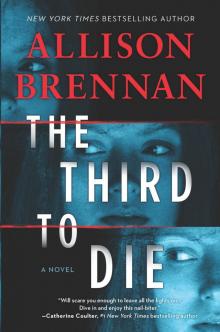 The Third to Die
The Third to Die Nothing to Hide
Nothing to Hide No Way Out
No Way Out Cold as Ice
Cold as Ice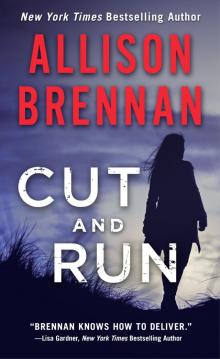 Cut and Run
Cut and Run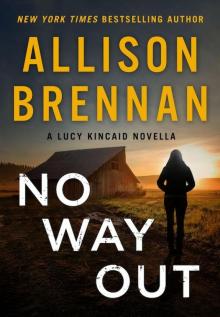 No Way Out (Lucy Kincaid Novels)
No Way Out (Lucy Kincaid Novels) Storm Warning
Storm Warning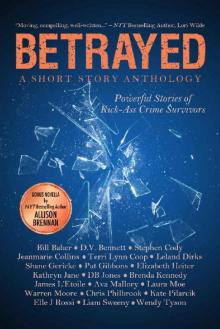 Betrayed: Powerful Stories of Kick-Ass Crime Survivors
Betrayed: Powerful Stories of Kick-Ass Crime Survivors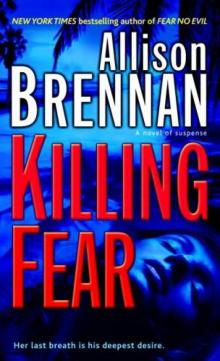 Killing Fear pb-1
Killing Fear pb-1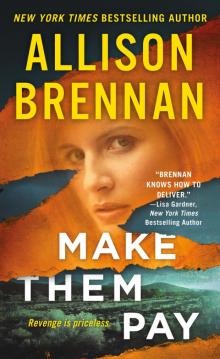 Make Them Pay
Make Them Pay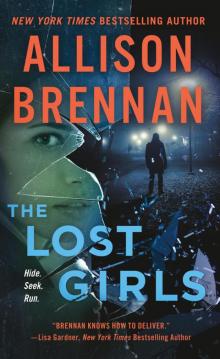 The Lost Girls
The Lost Girls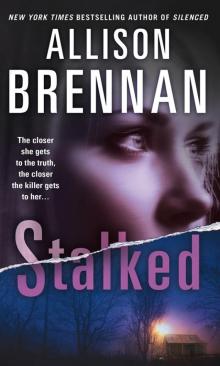 Stalked
Stalked Killing Justice
Killing Justice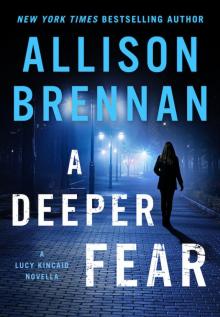 A Deeper Fear
A Deeper Fear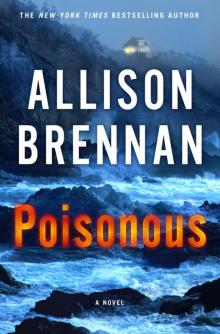 Poisonous
Poisonous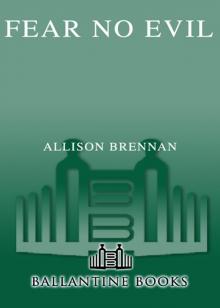 Fear No Evil
Fear No Evil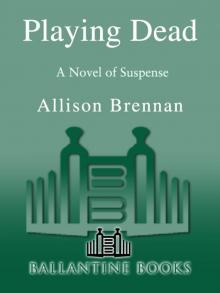 Playing Dead
Playing Dead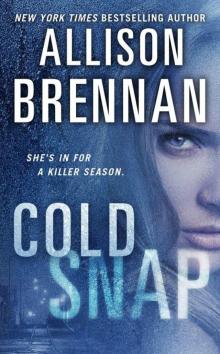 Cold Snap
Cold Snap Vacation Interrupted
Vacation Interrupted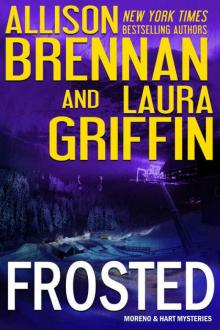 Frosted (Moreno & Hart Mysteries)
Frosted (Moreno & Hart Mysteries)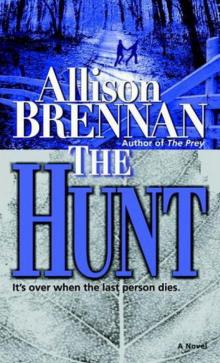 2 - The Hunt
2 - The Hunt Stolen
Stolen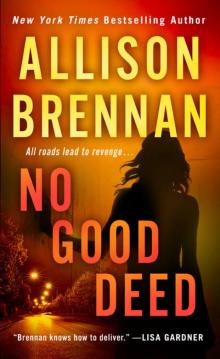 No Good Deed
No Good Deed Cutting Edge
Cutting Edge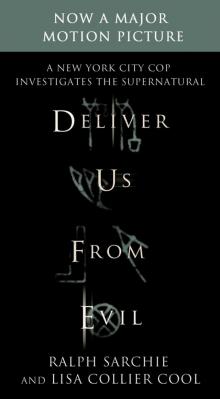 Deliver Us from Evil
Deliver Us from Evil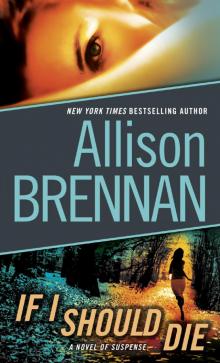 If I Should Die
If I Should Die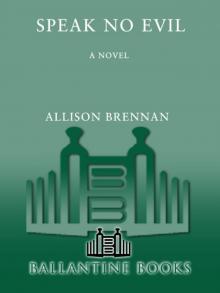 Speak No Evil
Speak No Evil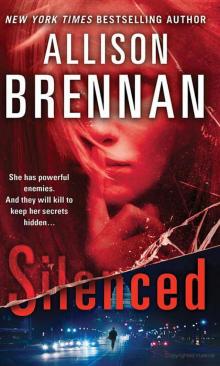 Silenced lk-4
Silenced lk-4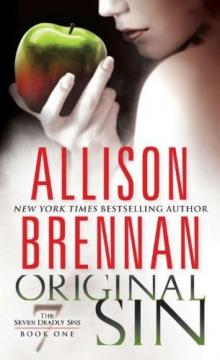 Original Sin sds-1
Original Sin sds-1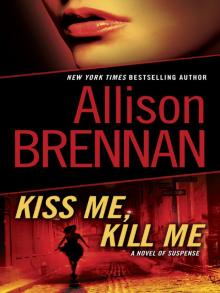 Kiss Me, Kill Me lk-2
Kiss Me, Kill Me lk-2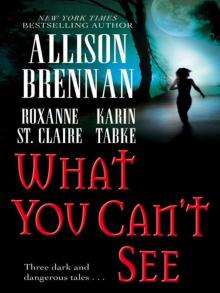 What You Can’t See
What You Can’t See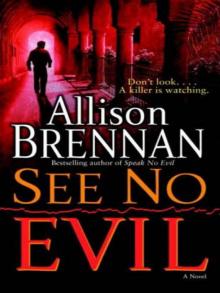 See No Evil
See No Evil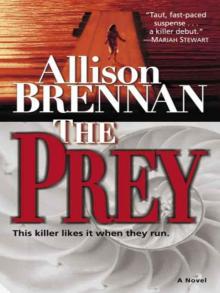 The Prey
The Prey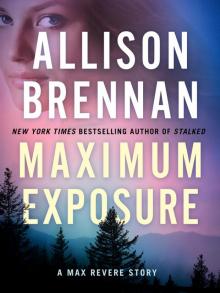 Maximum Exposure
Maximum Exposure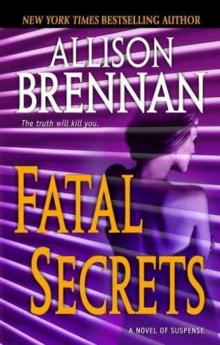 Fatal Secrets f-2
Fatal Secrets f-2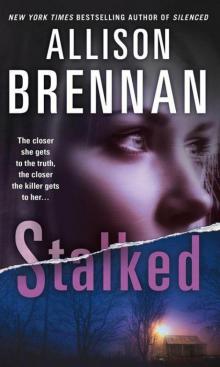 Stalked lk-5
Stalked lk-5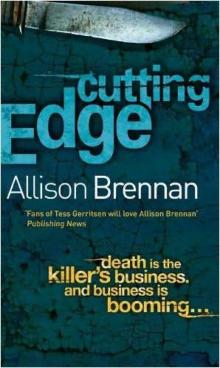 Cutting Edge f-3
Cutting Edge f-3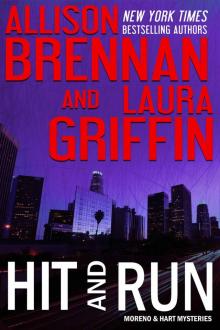 Hit and Run (Moreno & Hart Mysteries)
Hit and Run (Moreno & Hart Mysteries)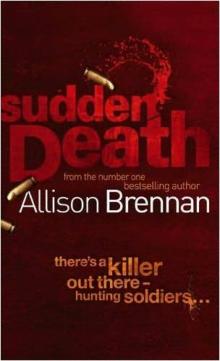 Sudden Death f-1
Sudden Death f-1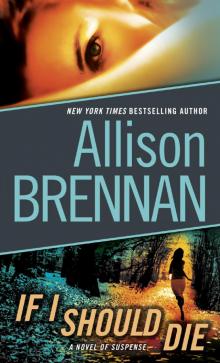 If I Should Die lk-3
If I Should Die lk-3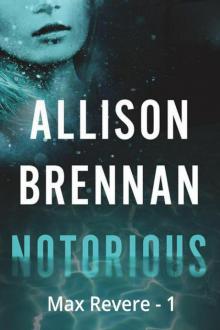 Notorious
Notorious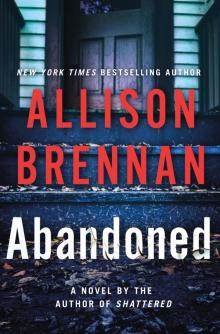 Abandoned
Abandoned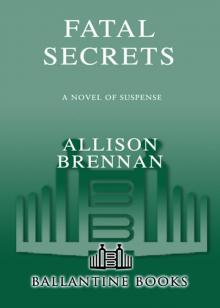 Fatal Secrets
Fatal Secrets The Hunt
The Hunt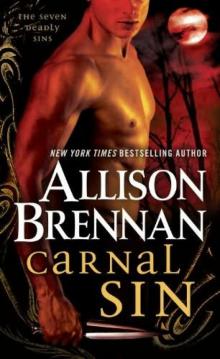 Carnal Sin sds-2
Carnal Sin sds-2 Love Is Murder
Love Is Murder Lost and Found
Lost and Found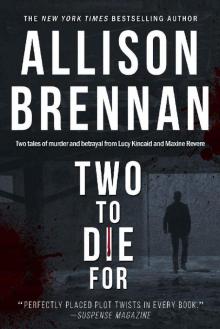 TWO TO DIE FOR
TWO TO DIE FOR Breaking Point
Breaking Point Best Laid Plans
Best Laid Plans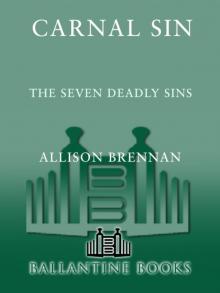 Carnal Sin
Carnal Sin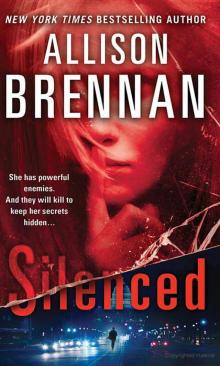 Silenced
Silenced Dead Heat
Dead Heat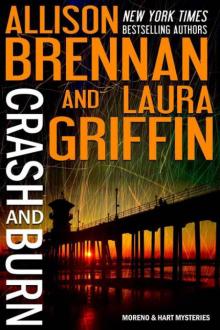 Crash and Burn
Crash and Burn Sudden Death
Sudden Death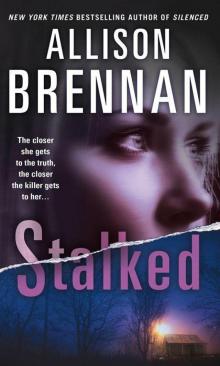 Lucy - 05 - Stalked
Lucy - 05 - Stalked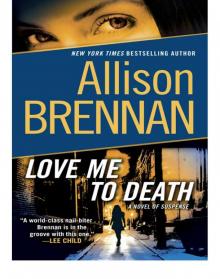 Mortal Sin
Mortal Sin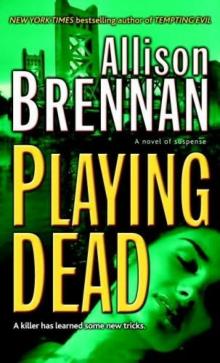 Playing Dead pb-3
Playing Dead pb-3 Kiss Me, Kill Me
Kiss Me, Kill Me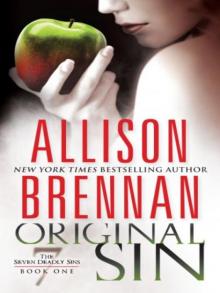 Original Sin: The Seven Deadly Sins
Original Sin: The Seven Deadly Sins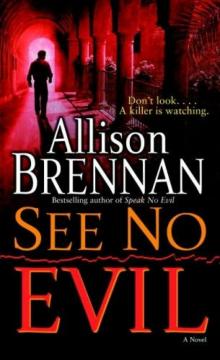 See No Evil e-2
See No Evil e-2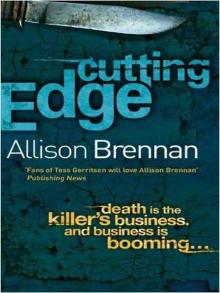 Cutting Edge: A Novel of Suspense
Cutting Edge: A Novel of Suspense Original Sin
Original Sin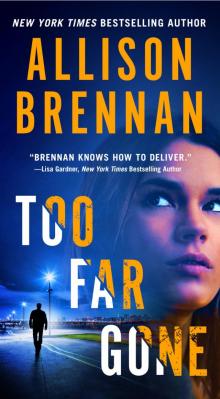 Too Far Gone
Too Far Gone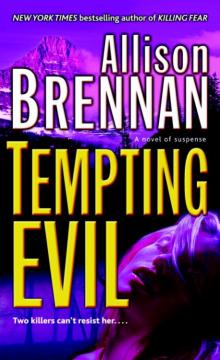 Tempting Evil
Tempting Evil Shattered
Shattered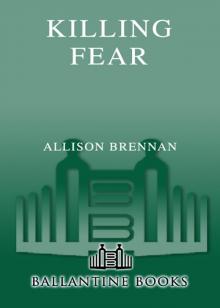 Killing Fear
Killing Fear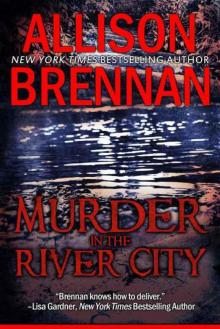 Murder in the River City
Murder in the River City Love Is Murder (lucy kincaid)
Love Is Murder (lucy kincaid)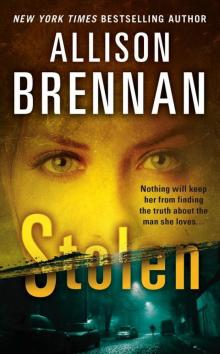 Stolen (Lucy Kincaid Novels)
Stolen (Lucy Kincaid Novels)